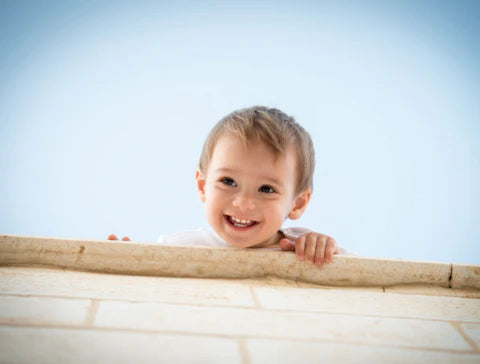What Are Deciduous Teeth?
First teeth start to erupt from 6-10 months after birth. There are typically 20 deciduous teeth — 10 upper and 10 lower. They are start to grow from the middle to both sides.
The names of the five teeth are:
- Central incisor
- Lateral incisor
- Canine
- First molar
- Second molar.
How The Deciduous Teeth Growing?
Generally the lower teeth are earlier than the corresponding upper teeth, and the girl’s teeth are earlier than the boy’s.
Typically, baby's first teeth will start growing in when baby are about 6 months old.
- The first tooth to grow is usually the central incisor at middle of lower.
- The second central incisor to grow is right next to the first.
- The next two teeth to grow are usually the two upper central incisors. After these two upper central incisors have grown out, two upper lateral incisors will grow next to the upper central incisors. They usually start erupting about two months after the same tooth on the lower grow. Then the next two lower lateral incisors will grow.
- After all the incisors have grown out, two lower canines and two upper canines will grow. But they do not next to the incisors.
- The next four to grow between the incisors and the canines are the first molars, two upper and two lower.
- The second molars are usually the last of the 20 deciduous teeth.

Every baby is different, so the time and sequence of eruption of baby's first teeth are also different. Early teething does not mean good growth, and late teething does not mean delayed growth.
For example, the eruption time of the baby's first tooth varies from 6 to 10 months, so there is no need to worry too much during this time period.
The medical definition of delayed teething is that the first deciduous tooth has not grown after 13 months. There are many reasons for delayed tooth eruption, which may be idiopathic, or it may be related to heredity, disease and food shape. If the baby is diagnosed with delayed teething, it is best to seek medical attention in time to find out the cause.
How To Care During Teething
During teething, the baby will feel uncomfortable. Sometimes you will find your baby’s gums are swollen, and the baby drools, likes to bite, and refusing to eat.
This situation is not uncommon. It is normal for the baby to feel uncomfortable when deciduous teeth grows out of the baby's mouth.
Here are some tips to help your baby alleviate the discomfort.
- Using a suitable teether for babies.
- Or washing your hands, soaking your finger in cold water, and then massaging your baby's gums to relieve the discomfort.

If the baby's drooling is more serious, you have to wipe the baby's saliva frequently to prevent the skin from irritation and inflammation.
Unless there is a serious condition, no special medication is needed during teething.
When Is The Best Time For Baby To Start Brushing?
The sooner the baby starts brushing the teeth, the better. There is no need to wait for the baby teeth to grow before brushing. As long as the teeth grow out, you can start brushing baby's deciduous teeth.
Recommendation Of Brushing Teeth
The baby’s first teeth and gums are relatively fragile, here are some recommendation for you.
- Use baby-specific finger toothbrush, which can be replaced with a soft toothbrush after one year of age.
- Toothpaste is best to use fluoride toothpaste.
- Clean the surface of your baby's teeth gently 1-2 times a day, taking care not to miss the gap between the teeth.
-
While brushing your baby's teeth, you need also pay attention to prevent the baby from swallowing too much.





















